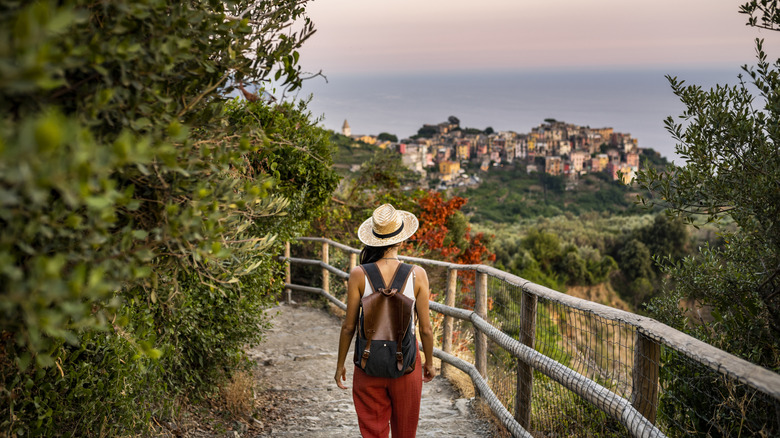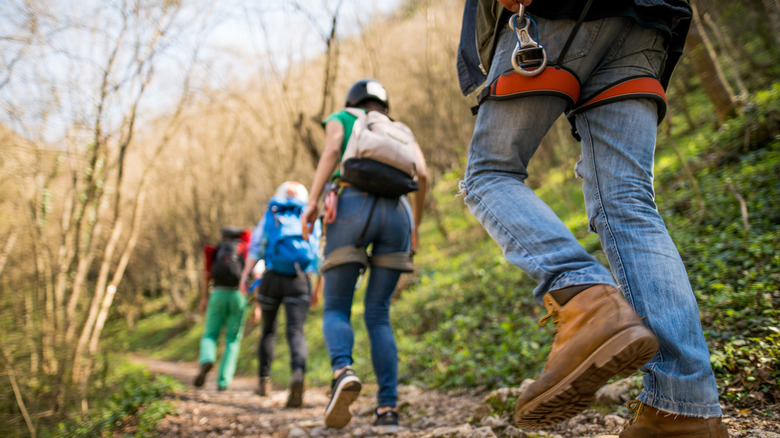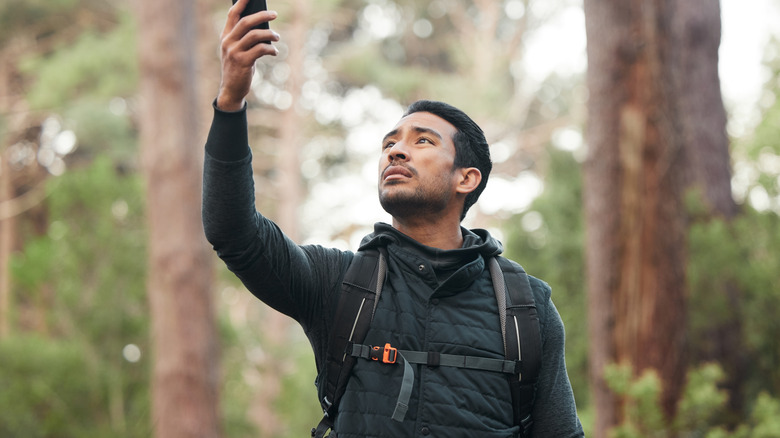What It Means To Go 'Web-Walking' On A Hike And Why You May Want To Avoid It
Being the first person on the trail at dawn comes with its own kind of magic — you get to have a quiet environment and golden lights from the sky all to yourself. But one thing tends to happen: You might run into a spider web, as sticky silk clings around your face and gear. And what does that make you? It makes you a "web-walker," someone who gets to the trail before anybody else early in the morning and has to be the one clearing the spider webs on the way. The act itself is known as "web-walking," which is one of the terms hikers should know. If you've ever experienced this web-clearing exercise after heading out for a hike earlier than others, you might be glad to realize there's a term for it.
Spiders are nature's artists that often spend the night weaving intricate webs across paths, along trail edges, and between trees, when humans must have gone hitting the sack. And come sunrise, it's your forehead, hair, or entire face that comes crashing suddenly into the finely spun silk. Although this might feel uncomfortable and most likely make you flinch, seasoned hikers believe that being the first on the trail offers solitude and serenity, plus a fresh and untouched feel of the natural atmosphere of dawn.
Why you may want to avoid web-walking
Being the first on the trail may sound interesting and idyllic, with the unfiltered experience of cooler air, peaceful views, and fewer people around — until you realize you're already becoming a cobweb lord or collector. Besides the unpleasant silk-surprise your face, hair, and other parts of your body would have to bear, web-walking can in fact slow you down as you struggle with the silky mess on the path: Some spider webs are actually strong and difficult to clear, leading to further stress. So you realize being early isn't always glamorous, after all.
Moreover, there's the unsettling possibility that you might knock the spider loose and onto your shirt. The spider might even crawl into your hair or right under your clothes, potentially freaking you out upon sudden realization — especially if you have arachnophobia (fear of spiders). While most spiders are harmless, some of them can actually bite when they feel trapped or threatened — say, you unknowingly press the spider against your skin. The bite can lead to mild irritations, redness, or swelling. Worse still, there can be more serious complications, like tissue damage — requiring urgent medical attention — especially if you're bitten by venomous species like black widow or brown recluse.
Finding your way around the web-walking woes
If despite the warnings, you're still determined to catch that sunrise, then there are ways to defend against these silky obstructions — while you equally make yourself feel safer as you hike. One simple way out involves getting a sturdy stick that's about 3ft long. Alternatively, your trekking pole can also be useful in this case — apart from its normal function of providing balance and stability while hiking. By waving the stick or pole, you can get rid of the webs before they reach your pretty face. Another clever way around it is to simply wait till some minutes after sunrise — as earlier hikers must have cleared the trail before your arrival.
Still, you might just take on the web-walking task as some kind of badge of boldness and adventure. Dr. D. (Rowdy), for instance, shares proudly via his personal blog (Hike It Forward): "I have an uncanny knack of giving the spider a ride on my hat or on my shoulder after destroying his masterpiece spread across the trail." This simply shows that, while walking through webs may feel like something out of a horror movie for some people, it's rather an enjoyable experience for others. But, most importantly, know and do what works for you, and follow essential safety tips when hiking.


